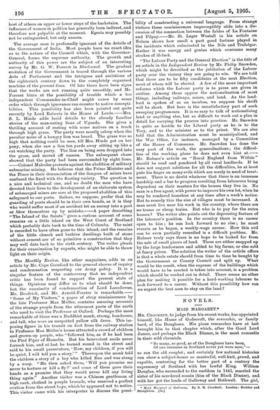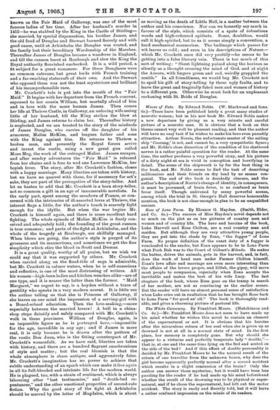MAID MARGARET.*
NOVELS.
MR. CROCKETT, to judge from his recent works, has appointed himself, like Hume of Godscroft, the sennachie, or family bard, of the Douglases. His pious researches have at last brought him to that chapter which, after the Good Lord James, and perhaps the Black Dinner, is the most romantic in their wild chronicle.
"So many, so good, as of the Douglases have been,
Of one surname in Scotland never yet were seen,"— so ran the old couplet ; and certainly few national histories can show a subject-house so masterful, well-knit, proud, and capable, contesting for the better part of a century the supremacy of Scotland with her lawful King. William Douglas, who succeeded to the earldom in 1443, married the sister of his murdered cousin (him of the Black .Dinner), and with her got the lands of Galloway and Bothwell. The girl, • Maid Margaret of Galloway. By S. B. Crockett. London: Hodder and Stoughton. [65.] known as the Fair Maid of Galloway, was one of the most fanmus ladies of her time. After her husband's murder in 1452—he was stabbed by the King in the Castle of Stirling—
he married, by special dispensation, his brother James, and the old feud of Douglas and Stewart burned fiercely and with good cause; until at Arkinholm the Douglas was routed, and the family lost their hereditary Wardenship of the Marches. Thereafter James of Douglas became a wanderer in England, and till the cannon burst at Roxburgh and slew the King the Royal authority flourished unchecked. It is a wild period, a fit subject for a great romancer. For these Douglases were no common catera.ns, but great lords with French training and a far-reaching statecraft of their own. And the Stewart who opposed them was not the least mysterious and brilliant of his incomprehensible race.
• Mr. Crockett's tale is put into the mouth of the "Fair Maid." It begins with her departure from the French convent, espoused to her cousin William, but mortally afraid of him and in love with the more human James. Then comes her life at Thrieve Castle, in Galloway, an unloving wife seeing little of her husband, till the King strikes the blow at Stirling, and James returns to claim her. Thereafter history is neglected, and we are treated to the story of the misdeeds of James Douglas, who carries off the daughter of his armonrer, Malise McKim, and leagues father and sons with the King against him. He returns to Thrieve a broken man, and presently the Royal forces arrive and invest the castle, using a new great gun called Mons Meg, the work of the outraged Malise. James escapes, and after sundry adventures the "Fair Maid" is released from her chains and is free to wed one Lawrence McKim, her boyish lover. The story, after Mr. Crockett's fashion, closes with a happy marriage. Many liberties are taken with history, but we have no quarrel with these, for if necessary for art's sake, they are part of the prerogative of the story-teller. And let us hasten to add that Mr. Crockett is a born story-teller, not so common a gift in an age of innumerable novelists. In the early part, spent among the meadows of France, or con- cerned with the intricacies of ill-assorted loves at Thrieve, the interest flags a little, for the author's touch is scarcely light enough for the idyllic. But when the war begins Mr. Crockett is himself again, and there is some excellent hard fighting. The whole episode of Malise McKim is finely con- ceived and adequately told ; the founding of the great cannon is true romance ; and parts of the fight at Arkinholm, and the whole of the tragedy at Roxburgh, are skilfully managed. When blows are going, the author's style is purged of its grossness and its mannerisms, and sometimes we get the fine simplicity which stirs the blood in Scott and Dumas.
It is a great quality, worthy of all praise, but we wish we could say that it was supported by others. Mr. Crockett when carried along on the flood-tide of saga is admirable, but Mr. Crockett in calmer waters, when he is self-conscious and reflective, is one of the most distressing of writers. All his women—high-born ladies and kitchen wenches alike—are of one type, and it is nearer the latter than the former. "Maid Margaret," we regret to say, is a hoyden without a trace of gentility who speaks in a very modern accent. It is little use the author telling us that she is Princess of Galloway, if she leaves on our mind the impression of a serving-girl with a Board-school education. Then the love-making,—more especially between the married lovers ! A bull in a china- shop steps daintily and safely compared with Mr. Crockett's walk in these provinces. William of Douglas, again, is an impossible figure as he is portrayed here,—impossible for the age, incredible in any age ; and if James is more real, it is only because he is drawn after the pattern of the rustic Don Juan, who is the fitting counterpart of Mr. Crockett's womenfolk. As we have said, liberties are taken with history, and there are a hundred flagrant anachronisms of style and matter; but the real blemish is that the whole atmosphere is sham antique, and aggressively false. Mr. Crockett's imagination has no power to achieve that ubtle understanding of an epoch which can make it live again in all its full-blooded and intricate life for the modern world. He is plagued, too, with a strain of sentiment, which is always labouring after "last testimonies," and "death-bed re- pentances," and the other emotional properties of second-rate fiction. Why the good story of the fight at Arkinholm should be marred by the letter of Magdalen, which is about
as moving as the death of Little Nell, is a matter between the author and his conscience. Nor can we honestly say much in favour of the style, which consists of a spate of robustious words and high-coloured epithets. Some, doubtless, would call it high-spirited, but to us it seems simply a convention, a bard mechanical mannerism. The badinage which passes for wit leaves us cold ; and even in his descriptions of Nature— which Mr. Crockett once did very prettily—he seems to be getting into a false literary vein. There is too much of this sort of writing : "Sheet lightning pulsed along the horizon as silently as a thought crossing the mind of God, and at night the Aurora, with lingers green and red, weirdly grappled the zenith." In all friendliness, we would beg Mr. Crockett not to spoil his gift of story-telling by these ugly faults, and to leave the great and tragically fated men and women of history to a different pen. Otherwise he must look for an unpleasant reckoning with St. Bride of Douglas.
Waves of Fate. By Edward Noble. (W. Blackwood and Sons. 6s.)—There have been published lately a great many studies of neurotic women; but in his new book Mr. Edward Noble makes a new departure by giving us a very minute and careful picture of a neurotic man. It is obvious that a book on this theme cannot ve7 well be pleasant reading, and that the author will have no easy task if he wishes to make his hero even passably attractive. Arthur Norris, the unfortunate master of the sailing ship Coorang,' is not, and cannot be, a very sympathetic figure; and Mr. Noble's close dissection of the condition of his shattered nerves is a rather painful operation for the reader. At the same time, the author produces a very powerful story, and his picture of a dirty night at sea is vivid in conception and horrifying in detail. The scene of the shipwreck is by far the best thing in the book, and Mr. Noble seems to find the task of describing millionaires and their friends on dry land by no means con- genial. The end of the book is decidedly obscure, and the author's description of Norris's change of identity, in consequence, it must be presumed, of brain fever, is as confused as brain fever itself. Though enlivened by many powerful scenes, among which the trial in St. George's Hall deserves honourable mention, the book is not clear enough in plan to be an unqualified success.
Rose of Lone Farm. By Eleanor G. Hayden. (Smith, Elder, and Co. 6s.)—The success of Miss Hayden's novel depends not so much on the plot as on her pictures of country men and women and of country life. The hero and heroine of the book, Luke Harwell and Rose Chilton, are a real country man and maiden. But although they are very attractive young people, they are put into the shade by Esau, "the fogger " of Lone Farm. No proper definition of the exact duty of a fogger is vouchsafed to the reader, but Esau appears to be to Lone Farm what Pooh Bah was to the Court of Gilbert's Mikado. He makes the butter, drives the animals, gets in the harvest, and, in fact, does the work of head man under Farmer Chilton himself. Esau's love affair and marriage are even more interesting than the affairs of the lovers proper, and Zillah, the gipsy, will move most people to compassion, especially when Esau accepts the inevitable and makes the best of his wife Lucy. The last chapters of the book, where Rose goes on the tramp in search of her mother, are not as convincing as the earlier scenes. But the reader will have an almost personal sense of satisfaction when Luke cries out in exultation that he has brought Rose back to Lone Farm "for good an' all." The book is thoroughly read- able, and gives a charming picture of pastoral life.
The White Causeway. By Frankfort Moore. (Hutchinson and Co. 6s.)—Mr. Frankfort Moore does not seem to have made up his mind whether he wishes this novel to contain an element of the supernatural or not. It is obvious that his heroine after the miraculous return of her soul when she is given up as drowned is not at all in a normal state of mind. In the first place, her memory is completely gone. But why should she appear to a virtuous and perfectly temperate lady " double,"— that is, at one and the same time lying on the bed and seated on the side of the bed ? And if this effect of double personality is decided by Mr. Frankfort Moore to be the natural result of the return of one traveller from the unknown bourn, why does the girl become apparently perfectly normal after a second accident which results in a slight concussion of the brain? Only the author can answer these mysteries ; but it would have been less puzzling for the reader if he had made up his mind beforehand whether the result of the drowning was to be physical or super- natural, and if he chose the supernatural, had left out the motor accident. The story is easily and fluently told, but it will leave a rather confused impression on the minds of its readers.







































 Previous page
Previous page